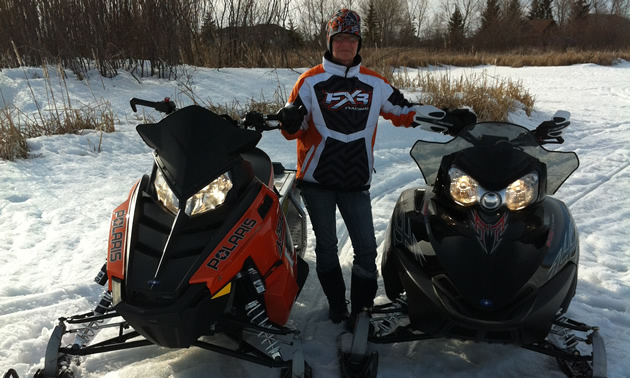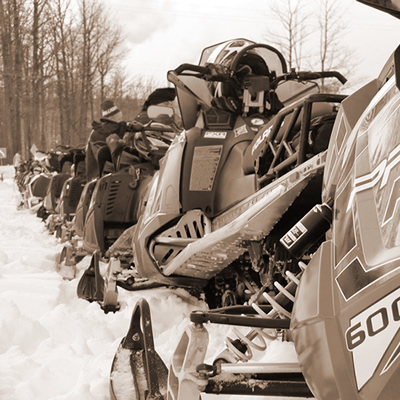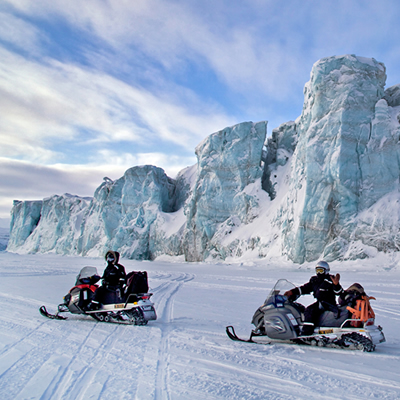In spite of being just five foot three and weighing in at around 105 pounds, Cindy McRae has always been a snowmobiling powerhouse.
At the age of six, McRae went snowmobiling with her dad and fell passionately in love with the sport. By the age of 15, she was sledding solo from her home in Winnipeg, Manitoba, to the farming community of Marquette—about 45 minutes away by car—to join her Uncle Johnny and her boy cousins in snowmobile poker derbies. These occasions ended in solo sledding trips back to Winnipeg—in the dark.
In 1998, McRae moved to Gimli, Manitoba, where she can snowmobile right from her doorstep. She works as a paralegal and is the secretary of the Interlake Snow Trackers club in Gimli.
Bumps on the trail
McRae was seriously injured in February 2007 during the Pink Ladies Snow Ride, a sledding fundraiser for breast cancer research organized by Club Snow in Portage la Prairie. She sustained a left tibial plateau fracture—that didn’t get diagnosed until two months later—and a severe laceration to her right buttock, with serious blood loss and wood splinters embedded deep in the tissue.
Changes to her gait after the knee fracture resulted in ongoing severe back pain. McRae also developed complex regional pain syndrome, a rare condition characterized by pain and hypersensitivity, particularly to cold. Determined to get back on her sled, McRae bought herself some heated pants.
The back pain was unrelenting, however, and in desperation McRae asked her doctor to do investigations for cancer. Though she was initially given a clean bill of health, a mammogram two months later showed a lump in her right breast.
“It turned out I had Stage 3 cancer,” McRae said. “I was awake in my very own nightmare—all day and all night.”
Supported on her healing journey
Understandably upset and frightened by the diagnosis, McRae said that having spent time sledding with and talking to many breast cancer survivors, she was a little less frightened than she might have been. Because the cancer had advanced to her lymph nodes, her treatment was aggressive: mastectomy, chemotherapy and radiation therapy.
From the moment she was diagnosed, McRae shared her feelings with family and friends and posted a blog in which she talked about her treatment. Her family, her Bosom Buddies cancer group and her snowmobiling circle supported her in every possible way, visiting her in hospital and at home, bringing cards, flowers, food, gifts and good wishes. Loving, supportive emails and Facebook messages poured in.
“My extended sledding family assisted me in what has been my most difficult journey in life,” McRae said.
A couple of days after her chemo was finished in October 2012, McRae bought herself a new sled. During her radiation therapy, whenever she felt well enough, she joined other club members on the trails.
“When they would see me take off my helmet and put on my Club Snow toque that reads ‘Do it til it melts,’ they would stare," McRae said. "You have that look when you do chemo that everyone just simply recognizes right away. The funny thing is that the stares only lasted a second or two; the next thing, we were talking and asking each other where we'd been or where we were off to and what adventure we’d had.”
McRae said that her sledding friends may not realize how much they helped her.
“Healing and moving forward when you have cancer is hard enough, but with the support of my passion for sledding and my fellow sledders, I forgot about everything except for riding," she said. "No worries, no soreness, no sickness, no cancer—it was all left behind with the 3,000 or so miles that I managed to put on that season. If I can help just one person, then I’m on the right track.”
McRae finished her radiation treatments in January 2013, and a CT scan in early November confirmed that she is cancer free. With the first snowfall on the ground, McRae and her friends are impatient for the sledding season to get underway.







